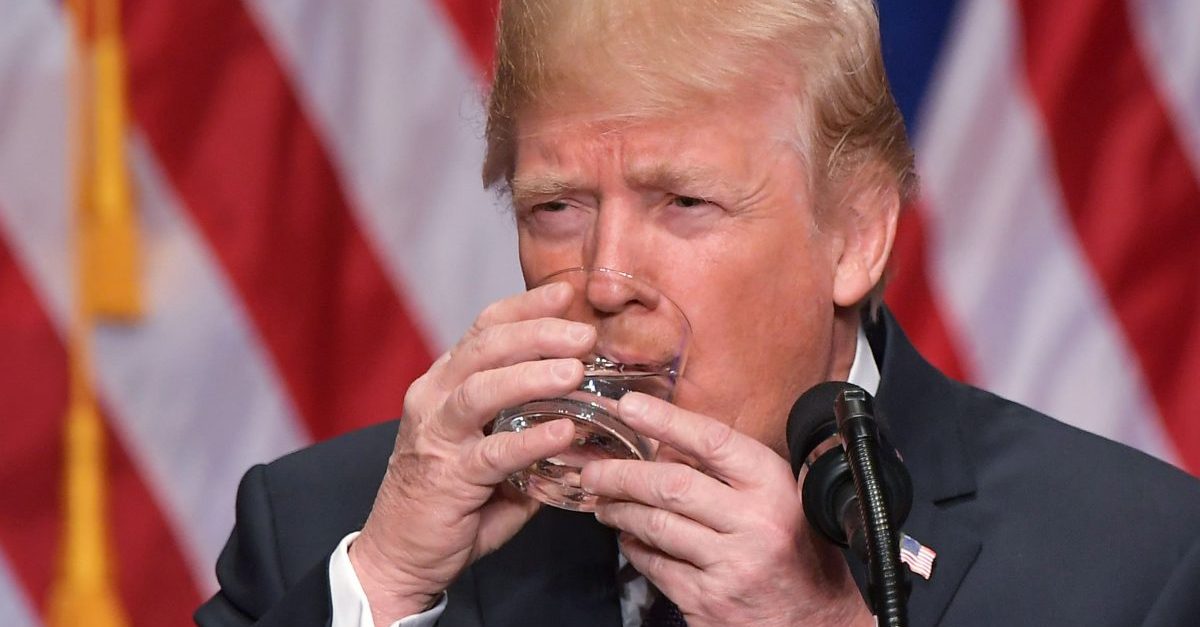
President Donald Trump reportedly does not believe the Russian Federation actually interfered in the 2016 U.S. presidential election.
According to a New York Times report published late Tuesday, President Trump spoke with a reporter with the outlet on July 8, 2017 and insisted that Russia was “falsely accused” of meddling in the 2016 election contest. Trump apparently demanded that most of this conversation be conducted off the record–it’s unclear why this conversation is being reported now or if such reporting breaks the pact made between the reporter and the president.
The timing of the Trump-Times conversation is notable: coming just after Trump’s first two meetings with Russian President Vladimir Putin in Germany.
Per the report:
The day after the two meetings, as Mr. Trump was on Air Force One taking off from Germany heading back to Washington, he telephoned a Times reporter and argued that the Russians were falsely accused of election interference. While he insisted most of the conversation be off the record, he later repeated a few things in public in little-noticed asides.
Trump’s opinion that the Russian government was falsely implicated in the 2016 election interference scandal was apparently buoyed by conversations he had with Putin over the course of the Hamburg G20 summit. The 45th’s president takeaway from those talks was reportedly that American intelligence wouldn’t have caught on to official Russian involvement if such interference had actually occurred–due to Russia’s rumored expertise with hacking.
“He said that he raised the election hacking three times and that Mr. Putin denied involvement,” the Times report continues. “But he said Mr. Putin also told him that ‘if we did, we wouldn’t have gotten caught because we’re professionals.’ Mr. Trump said: ‘I thought that was a good point because they are some of the best in the world’ at hacking.”
National security law experts heavily criticized Trump’s comments. National security lawyer Mark Zaid said they were confounding and predicted they might lead to an investigation.
“President Trump’s behavior remains perplexing and unexplainable,” Zaid said in an email to Law&Crime. “Never before has a U.S. president so aggressively defended a country viewed as our enemy for more than seven decades. It has become clear one cannot rely upon the truthful accuracy of anything President Trump says so we are at the stage as to whether his conduct and speech will be explained at some point in the future through legal or political proceedings.”
Zaid’s colleague, national security lawyer Bradley P. Moss, also took issue with Trump’s reported comments on Russian interference.
“Even if we assume this has nothing to do with the president being ‘compromised’ in some fashion, it is just one more example of how his deep insecurity about his own election victory pervades his assessment of the conclusions by his own intelligence agencies,” Moss told Law&Crime. “The repeated willingness of the president to accept Putin’s denials, and his subsequent dismissal of the [intelligence community’s] conclusions as being the product of ‘political opponents’…reflects a deep unease on his part about whether something other than his inflated sense of brilliance led to his upset victory in 2016.”
Tuesday’s report also makes note of a somewhat curious video that shows Trump gesturing at Putin across a large dinner table as world leaders sat down for an evening meal on the first night of the summit.
Not widely reported at the time of its initial publication, the video, Trump appears to point at Putin as if to gain his attention. When the Russian president appears to acknowledge Trump, the American president makes a motion best described as a fist pump.
[image via MANDEL NGAN/AFP/Getty Images]